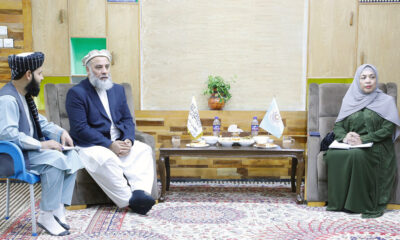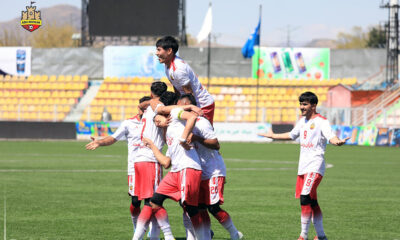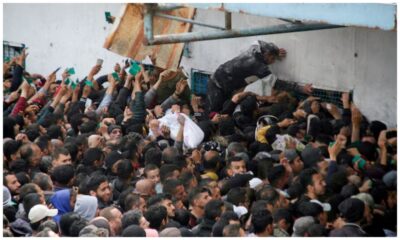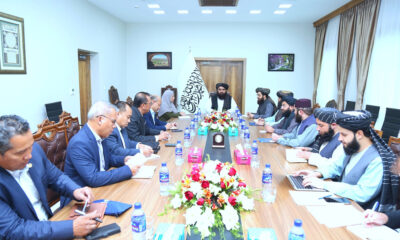World
Crowds gather in London for moment in history as King Charles is crowned

Crowds from across Britain and the world gathered on Saturday in London where Charles III will be crowned king in Britain’s biggest ceremonial event for seven decades, a sumptuous display of pageantry dating back 1,000 years.
Charles succeeded his mother Queen Elizabeth when she died last September and at 74, he will become the oldest British monarch to have the 360-year-old St Edward’s Crown placed on his head as he sits upon a 14th century throne at London’s Westminster Abbey.
Watched by about 100 heads of state and dignitaries, including U.S. first lady Jill Biden, and millions on television, Charles follows his predecessors from the time of William the Conqueror in 1066 in being crowned at the abbey.
His second wife Camilla, 75, will be crowned queen during the two-hour ceremony which, while rooted in history, will attempt to present a forward-looking monarchy.
With Britain struggling to find its way in the political maelstrom after its exit from the European Union and maintain its standing in a new world order, the royal family still provides an international draw, a vital diplomatic tool and a means of staying on the world stage.
“No other country could put on such a dazzling display – the processions, the pageantry, the ceremonies, and street parties,” Prime Minister Rishi Sunak said.
“It’s a proud expression of our history, culture, and traditions. A vivid demonstration of the modern character of our country. And a cherished ritual through which a new era is born.”
Despite Sunak’s enthusiasm, the coronation is taking place amid a cost of living crisis and public scepticism, particularly among the young, about the role and relevance of the monarchy.
Saturday’s event will be on a smaller scale than that staged for Queen Elizabeth in 1953, but will still aim to be spectacular, featuring an array of historical regalia from golden orbs and bejewelled swords to a sceptre holding the world’s largest colourless cut diamond.
By early morning tens of thousands had begun massing along The Mall, the grand boulevard leading up to Buckingham Palace, with the crowd more than 20 people deep in some places, as troops in ceremonial uniforms and marching bands went past.
Rachel Paisley, a 45-year-old housewife, said she had travelled from her home in Switzerland with her husband and two children.
“It is a moment in history. We wanted to be here to see it and create some memories,” she said next to her son, who was wearing a Charles face mask, and her daughter, who sported a Union flag head band.
After the service, Charles and Camilla will depart in the four-tonne Gold State Coach that was built for George III, the last king of Britain’s American colonies, riding back to Buckingham Palace in a one-mile procession of 4,000 military personnel from 39 nations.
It will be the largest show of its kind in Britain since the coronation of Charles’ mother.
At the start of ceremonies, Charles and Camilla will travel from Buckingham Palace to the abbey in the modern Diamond State Jubilee Coach, with the service due to begin at 1000 GMT.
They will pass cheering crowds but also what anti-monarchists say will be the biggest protest mounted by republicans. More than 11,000 police will be on duty ready to stamp out any attempted disruption.
Once at the abbey, much of the ceremony will feature elements that Charles’ forebears right back to King Edgar in 973 would recognise, officials said. Handel’s coronation anthem “Zadok The Priest” will be sung as it has at every coronation since 1727.
But there will be new elements, including an anthem composed by Andrew Lloyd Webber, famed for his West End and Broadway theatre shows, and a gospel choir.
A Christian service, there will also be an “unprecedented” greeting from faith leaders and Charles’s grandson Prince George and the grandchildren of Camilla will act as pages.
However, there will be no formal role for either Charles’ younger son Prince Harry, after his high-profile falling out with his family, or his brother Prince Andrew, who was forced to quit royal duties because of his friendship with late U.S. financier Jeffrey Epstein, a convicted sex offender.
Charles will swear oaths to govern justly and uphold the Church of England – of which he is the titular head – before the most sacred part of the ceremony when he is anointed on his hands, head and breast by Archbishop of Canterbury Justin Welby with holy oil consecrated in Jerusalem.
After Charles is presented with symbolic regalia, Welby will place the St Edward’s Crown on his head and the congregation will cry “God save the King”.
His eldest son and heir Prince William, 40, will then pay homage, kneeling before his father, placing his hands between those of the king and pledging his loyalty as “your liege man of life and limb”.
Welby will call for all those in the abbey and across the nation to swear allegiance to Charles – a new element that replaces the homage traditionally sworn by senior dukes and peers of the realm.
However, that has caused controversy with anti-monarchist group Republic calling it offensive, forcing Welby to clarify it is an invitation not a command.
After returning to Buckingham Palace, the royals will make a traditional appearance on the balcony, with a fly-past by military aircraft.
Also in traditional British fashion, the weather in London could feature heavy bursts of rain, forecasters said, which could mean a slimmed down or even cancelled fly-past.
Celebrations will continue on Sunday with nationwide street parties and a concert at the king’s Windsor Castle home, while volunteering projects will take place on Monday.
“When you see everyone dressed up and taking part it is just fantastic. It makes you so proud,” said teacher Andy Mitchell, 63, who left his house in the early hours to get into London.
“My big concern is that younger people are losing interest in all of this and it won’t be the same in the future.”
World
Famine risk ‘very high’ in Gaza, especially in north, US official says
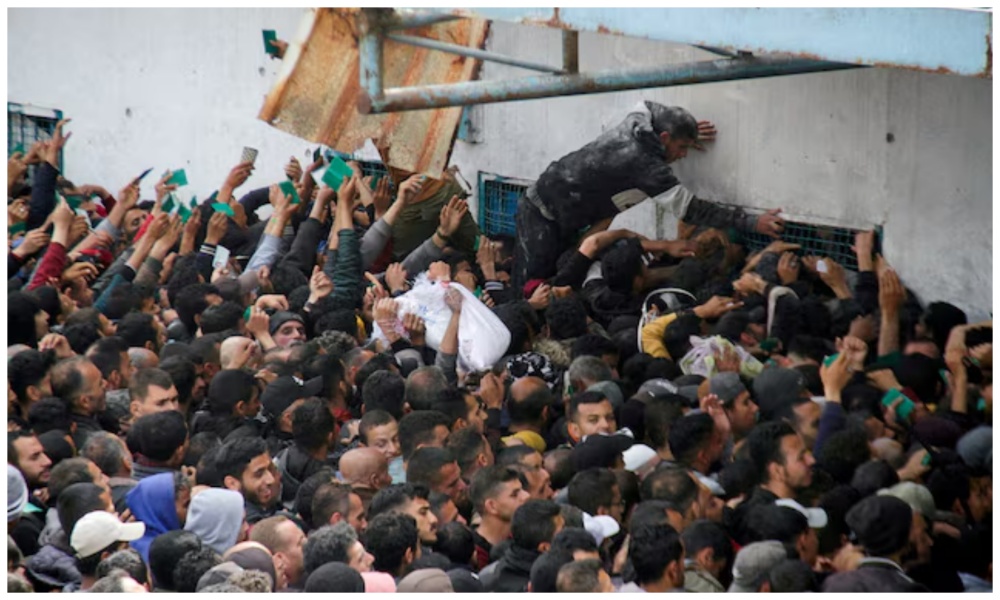
Israel has taken significant steps in recent weeks on allowing aid into Gaza, the U.S. special envoy for humanitarian issues said on Tuesday, but considerable work remained to be done as the risk of famine in the enclave is very high.
David Satterfield declined to say whether Washington was satisfied by Israel’s moves, weeks after U.S. President Joe Biden demanded action to alleviate the humanitarian crisis in Gaza, saying conditions could be placed on U.S. support for close ally Israel if it did not implement a series of “specific, concrete and measurable” steps.
“Israel has taken significant steps in these last two and a half weeks,” Satterfield told reporters.
“There is still considerable work to be done. But progress has been made.”
The risk of famine throughout war-devastated Gaza, especially in the north, is “very high”, he said, calling for more to be done to get aid to those in need in that part of the tiny, densely populated Palestinian territory, Reuters reported.
The United Nations has long complained of obstacles to getting aid in and distributing it throughout Gaza in the six months since Israel began an aerial and ground offensive against Gaza’s ruling Islamist militant group Hamas.
Israel’s military campaign has reduced much of the territory of 2.3 million people to a wasteland with an unfolding humanitarian disaster since October, when Hamas ignited war by storming into southern Israel.
The head of the U.N. Palestinian refugee agency (UNRWA), Philippe Lazzarini, said on Tuesday that the daily average number of trucks entering Gaza during April was 200 and that there had been a peak on Monday of 316.
There was also now a focus on garbage collection, he added, especially in southern Gaza, in a bid to avoid disease outbreaks as the warmer weather approaches.
World
North Korea officials visit Iran in a rare public trip
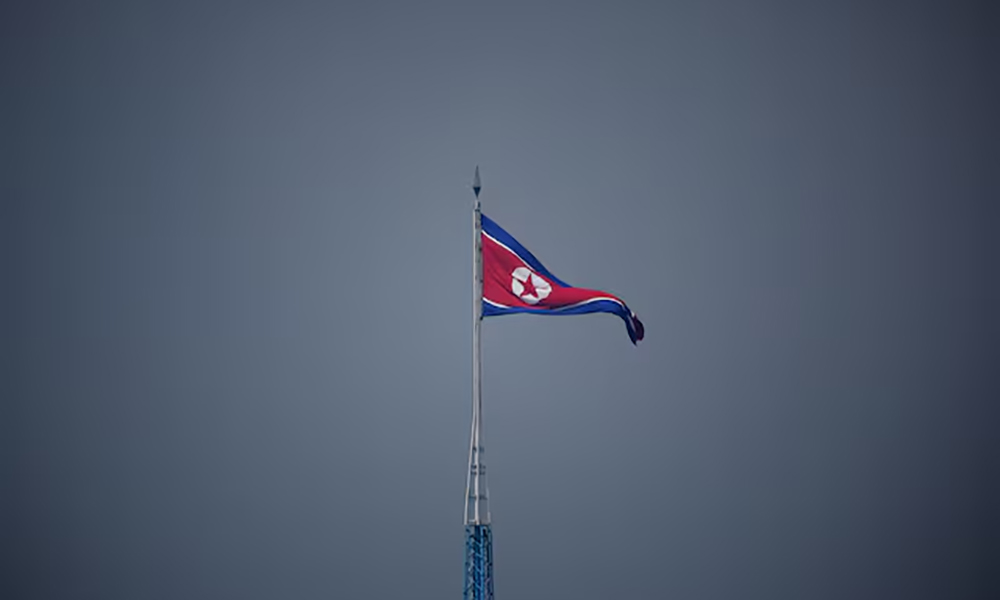
A North Korean delegation led by the cabinet minister for international trade is visiting Iran, the North’s official media said on Wednesday in a rare public report of an exchange between the two countries believed to have secret military ties, Reuters reported.
The minister for external economic relations, Yun Jong Ho, left Pyongyang on Tuesday by air leading a ministry delegation to visit Iran, the North’s KCNA news agency said. It gave no other detail.
North Korea and Iran have long been suspected of cooperating on ballistic missile programmes, possibly exchanging technical expertise and components that went into their manufacture, read the report.
Iran has provided a large number of ballistic missiles to Russia for use in its war with Ukraine, Reuters reported in February.
North Korea is also suspected of supplying Russia with missiles and artillery, although both countries have denied the allegation.
Yun has previously worked on the country’s ties with Syria, according to South Korean government database.
Yun has been active in the country’s increasing exchanges with Russia, earlier this month leading a delegation to visit Moscow, according to KCNA.
World
Malaysian navy helicopters collide in mid-air, 10 killed
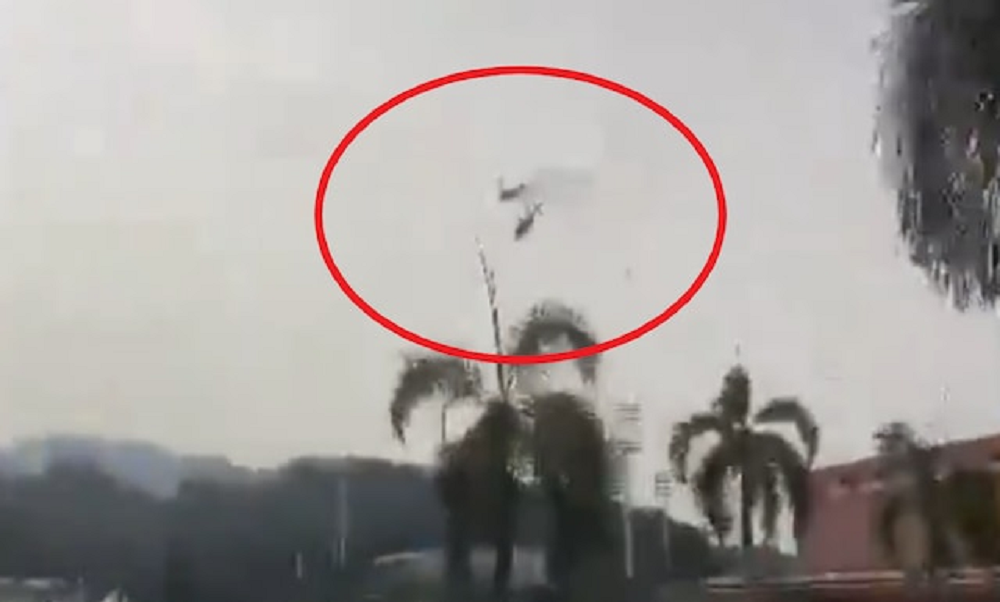
Two Malaysian navy helicopters collided in mid-air during a rehearsal for a naval parade on Tuesday, killing all 10 crew members aboard, the navy said in a statement.
The incident occurred at the Lumut naval base in the western state of Perak at 9.32 a.m. on Tuesday morning, the navy said.
“All victims were confirmed dead at the scene and sent to the Lumut naval base military hospital for identification,” Reuters reported the navy as saying.
A video circulating on local media showed several helicopters flying in formation, when one of the choppers’ rotor clipped another before both aircraft crashed into the ground.
Local police confirmed the footage was genuine.
The navy said it would carry out an investigation into the cause of the accident, Reuters reported.
Defence Minister Mohamed Khaled Nordin said the aircraft – a maritime operations helicopter and a Fennec military chopper – were rehearsing for a parade celebrating the 90th anniversary of the Royal Malaysian Navy, due to be held on Saturday.
Efforts were underway to verify the identities of the crew members killed, all of whom were below the age of 40, Mohamed Khaled told reporters.
-

 Sport5 days ago
Sport5 days agoRashid Khan threatens BBL pullout after Australia postpones Afghanistan T20I series
-

 Sport4 days ago
Sport4 days agoAfghanistan Champions League kicks off with grand opening ceremony
-

 Latest News3 days ago
Latest News3 days agoPakistan’s frontiers minister stresses ‘dignified’ return of Afghan refugees
-

 Regional4 days ago
Regional4 days agoIran’s foreign minister downplays drone attack, says Tehran investigating
-

 Latest News5 days ago
Latest News5 days agoTen people killed by floods in Helmand
-

 Business4 days ago
Business4 days agoAfghanistan’s economic prospects are bleak: World Bank
-

 Latest News4 days ago
Latest News4 days agoMore than 800 Afghan refugees deported from Pakistan in two days
-

 Regional2 days ago
Regional2 days agoIranian president lands in Pakistan for three-day visit to mend ties


